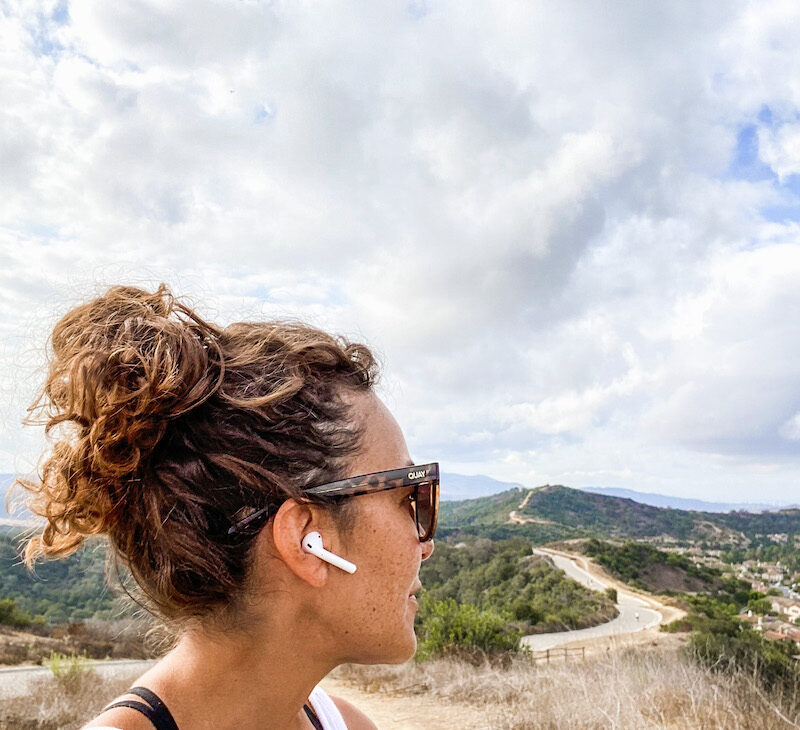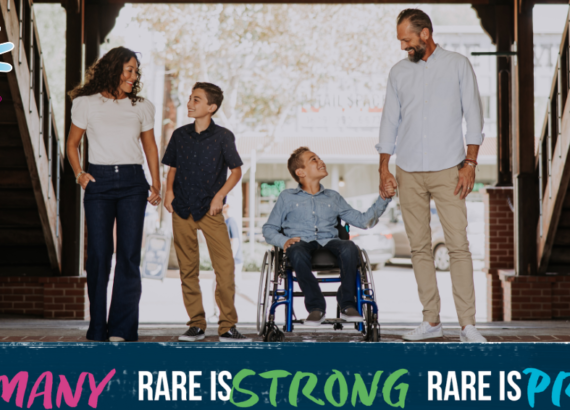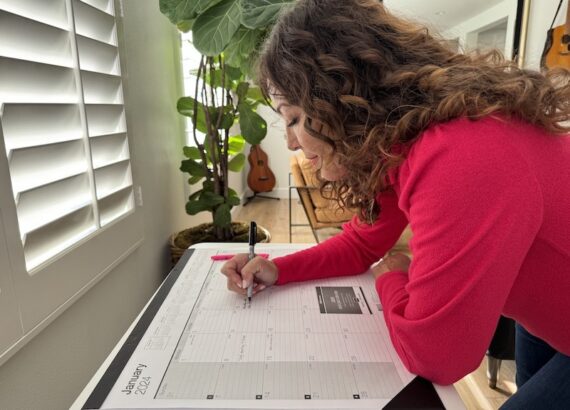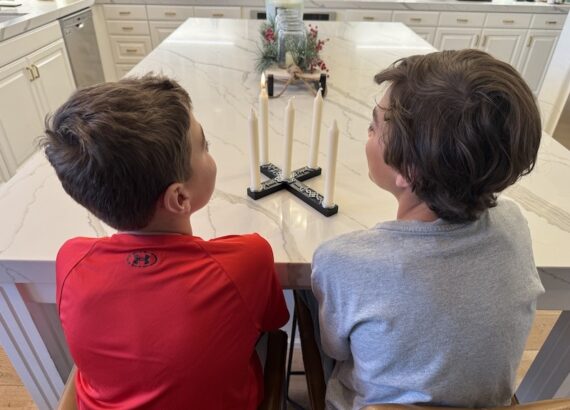What I Wish I Knew Then About Taking Care of Myself

We’ve all seen it… you get a rare disease diagnosis for your kid, and you set off in a wild frenzy to save your child, throwing every inch of yourself into it, barely eating, sleeping, exercising, processing, seeing friends, and getting any downtime.
Years later, you wake up, look in the mirror, and wonder who is looking back at you. Your back is aching, your eyes look tired, and your head is foggy.
I remember attending a conference when my son was newly diagnosed and receiving advice to take care of myself. “Care for the Caregiver, “they called it. “You can’t pour from an empty cup,” and “Put on your oxygen mask first,” they said. I’ll be honest; somehow, maybe I thought I was immune. I thought, I’m healthy and not too old; perhaps this doesn’t apply to me. Plus, my son needs me, and his needs are way more important than mine. I’ll catch up later once I’ve got everything in place for him. For now, it’s full steam ahead. Breaks are for sissies.
How smug and invincible I must have thought I was.
Or maybe it wasn’t even that. Perhaps it was just that I was so scared for my child that I was happy to put him first and sacrifice myself, my own body, and my own well-being if somehow it meant it could save his.
Or maybe it was because I was naïve. I don’t think I truly understood what it meant to have a child with a chronic illness. Everything hard I had been through before this was, for a moment in time, I don’t think I fully grasped that the effects of a rare disease could be continual, and I couldn’t outrun them.
Honestly, I think it was all of it.
It took back problems, a sprained ankle, and a torn meniscus in my knee to realize that I needed to slow down and take care of myself. And those were just the undeniable physical effects. I still couldn’t recognize the mental and emotional impact for years to come.
Do you know how many seasoned rare mamas who didn’t take care of themselves wish they would have taken better care of themselves sooner? All! If the amount of a mother’s love and self-sacrifice equated to treatments, cures, and pain-free existences for our children, there would be no more rare diseases.
Yes, perhaps, there are instances and situations when giving everything we have to give will get our children through some high-stakes situations like hospitalization, surgery, procedure, a trip to see a renowned specialist, getting them in a trial, etc. But running fast and hard is not sustainable for endless amounts of time! We are not machines. We cannot keep this pace without significant repercussions. We can’t keep running on empty forever.
We think to ourselves, “I’ll just get through this or that,” or, “this is just for now.” But let me ask the hard question? What if it’s not? What if these rare diseases just keep throwing things at us? What if this is our new way of life?
Our bodies, minds, and souls need time to recover and recoup from any significant event. Investing time in recovery is the only way to gear back up for what may be coming next.
Over time, I’ve gotten a little wiser to these realities, not because I’m smart, but because they’ve come up and slapped me in the face.
I remember when Miles was first diagnosed, and I emailed our friends to share the diagnosis news; I wrote, “SMA just messed with the wrong mama,” and I meant it. Getting ready to fight hard was a gut reaction that didn’t take much thought. Even in the fog and the heartbreak of the diagnosis, I was prepared to pull out my inner tigress and do battle. And so I did.
I was that fighter who came out swinging all heart, speed, and guts. I shoed away any good advice to pace myself and any sage warning to consider my own well-being, and now here I am years later, feeling all the effects.
I learned the hard way, so I share all of this with you so that you can be smarter than I was. Maybe you can choose to be savvier and less stubborn than “New-to-rare-mamahood-Nikki. These are lessons shared from one rare mama to another who wants a better outcome for you.
Actually, they are the lessons of thousands of rare mamas, therapists, and those far wiser than I am, who have shed light on the truths about our well-being, self-love, and self-sacrifice. It’s my mission to spread this knowledge because sometimes you can’t understand it any other way unless it comes from someone who is actually walking the same road. It was easy to discount these truths when they weren’t delivered from an actual mom who had lived this. I still kept thinking, “Yeah, but you don’t really get it; you don’t have a child with a rare disease.”
Perhaps there was truth to the thought that they couldn’t fully understand because they didn’t have a child with a rare disease. But there are also truths about the human mind, body, and spirit from which we aren’t exempt just because we have a child with a rare disease.
So let me impart some thoughts about what I wish I would have known then about taking care of myself from a mama who’s been there.
Self-Care Is An Essential Counter Punch
Self-care is essential. Full stop.
Self-care in our situation is vital to have the stamina to sustain. Taking care of ourselves is even more critical for caregivers like us. It’s critical to our well-being, and it’s vital to be able to serve our children. Our needs are also important and urgent, and we must take care of ourselves now. Our care and our child’s care go hand in hand. So instead of the common misconceptions about self-care, We need to shift our mindset to start thinking: taking care of ourselves is critical to fighting this fight.
Self-care is a counter punch.
How do we sustain a hit to our emotions? How do we weather the hard news we are bearing? How do we survive all the frightening appointments and procedures we are taking our children to and still have the emotional availability to comfort them? How do we endure the physical strain on our bodies from lifting, transferring, and carrying children with physical disabilities? How do we carry on when our faith is tested, feel numb, and feel lost?
Self-care activities are the very thing that can help us weather and endure all of this. Self-care is the very thing that can allow us to be more productive. Self-care has many scientifically proven benefits, including improved focus, pain reduction, blood pressure control, stress and anxiety reduction, improved immunity, and longevity.
Our care is not something to be set aside because we are rare mamas. Self-care is something to practice like a religion because we are rare mamas!
There’s Always Going to be Something To-Do
I never understood the “This is a marathon, not a sprint” saying. I mean, I understood what it meant, but I didn’t understand how to live it. There I was, sprinting along, trying desperately to get everything accomplished. I was trying to keep my head above water and trying to check everything off my to-do list.
I kept ticking away at that list, thinking, If I can just get it all done, then I can rest. But just as quickly as I checked something off the list, something new landed on the list. What the what? So I’d toggle and toil away at my list again and again. I’d feel a sense of accomplishment as I got through my list, only to have a cannon gun launch three new things my way. Instead of waiting until everything on my list is done, which by the way, means waiting until the end of time, I learned I need to rest anyway right now. Right. Now. So do you.
When Miles was newly diagnosed, we worked hard to get him leg braces, a stander, and a wheelchair and to see a team of specialists. I got to a place where I had finally checked all these things off our list, and I asked his amazing and wise physical therapist if we were done. She smiled and said in a kind and caring way, “Well, yes, you are done for now, but there will always be something you’re working on.” I didn’t know what she meant at the time. So in my head, I was like, Okay, that’s great, but we’re done, right?
Years later, I see what she meant: there may always be something around the corner to take care of, something your child is working on, or something on your list. I’m not saying this to panic you; I’m saying it so you can wrap your head around it early on and look at the road differently than I did. I’m saying it so you can come to terms with this reality. Instead of letting all of the to-dos make you frantic, learn to accept them gently and work through them as you can, when you can.
Children themselves are constantly changing and entering new phases and stages. Parents of typically developing children talk about this all the time. They continually try to keep up with the ever-changing child-rearing demands as their children grow, change, and develop. It’s the same with raising a child with a rare condition. They may outgrow equipment, need new adaptations, change providers, switch medicines, etc. This means we, as parents, are navigating through change, and our to-dos will reflect that.
We need to flip our way of thinking from trying to get it all done to pacing ourselves for the ebbs, flows, changes, and even the surprises that will undoubtedly be thrown our way.
When pressures are coming down all around you, and the pile of to-dos is miles long, you’ll need to sleep anyways. Though the heat is on, you’ll need to lay your weary head down and rest. Mama needs to take care of herself right at the height of intense times.
As moms, we’re all accustomed to pushing ourselves until things are done before we stop. We’re even accustomed to pushing ourselves to the brink of breaking. I’m not sure how this even makes sense, but somehow it does when you’re trying to save your child. But how does breaking ourselves allow us to help them? Seriously, it’s an oxymoron. It doesn’t make good sense. But it’s what we do.
If our body or our mind says rest, WE MUST LISTEN! Will we wait until we break down? Who will help our child then? Our bodies and our minds tell us things for a reason. Just because our child’s rare disease says go, go go, gimme, gimme, gimme doesn’t mean our bodies can accommodate these demands.
We have to make room for rest. When we’re constantly operating at ninety miles per hour, we must get in the slow lane from time to time and pull off the road to refuel. People can’t go full throttle all the time and still be effective. It’s necessary to take a break to recharge and return a bit replenished so you can start again. Yes, taking a break will be hard because you’ll feel like there’s still so much to do. There is, and there probably will always be. So you’re going to need to take a break despite that.
Say No To Other Things, So You Can Say Yes to You
Life is not going to stop while you’re going through this. I’m not even talking about anything related to rare disease life. I am talking about just regular old-life things. It will send you a zillion to-dos, invitations, expectations, commitments, and obligations. They’ll just keep coming at you like a freight train. Somehow life doesn’t let you off the hook just because you have a child with a rare disease.
It’s up to you to let yourself off the hook. That’s right; you’re going to be the one to grant yourself permission to change your commitments and your calendar. Trust me; no one else is going to do this for you. You won’t even believe what other people will still expect and ask of you. Like I said before, they just don’t know. They haven’t been through it, so they just don’t know.
Yes, some things you have to do. But others … well, do you? Do you have to do them? What can you say no to? What can you let fall away? What can you take your focus away from?
Where is all of this time going to come from to handle all the responsibilities that come with a rare disease? Seriously, extra hours will not get handed to you, along with the test results of your child’s diagnosis. It’s unfair, I know!
So where is the time going to come to fit everything in? It’s going to have to come from somewhere. And I guess what I’m saying is that it can’t come from your own care. Do you hear this, mamas? NOT FROM YOUR OWN CARE!!!
Woah, that came out in all caps. I’m not yelling at you so much as at the whole world. Do you hear this world? We will no longer give away our care to put something else before it! NO MORE!
Our children need us, and it’s one of the most important places we can put our time and energy into. And we need us. It’s one of the most important places we can put our time and energy into.
Find solutions that don’t involve sacrificing your own well-being. Get intentional about where you put your time and energy.
What fuels you? What serves you? What helps you uphold your family and your own well-being? Those are where you should be putting your limited time and finite energy.
There are going to be a lot of things in the rare disease world that we have to go and do whether we like it or not. So in other parts of your life, you’ll need to say no to things you just don’t want to do if you don’t really have to do them.
You need outlets that will charge, uplift, and encourage you. You need conduits to relaxation, restoration, and recuperation. And girl, we all need some places to just have some dang fun!
Run activities and invitations through a filter of restoration, joy, and excitement. Does this bring me joy? Does this excite me? Does this help restore me? If yes, then go. If no, then pass.
This is part of prioritizing ourselves and our own well-being. And it has to come from us. No one is going to do this for us. We have to set our own boundaries around our time and be the ones to enforce them.
Get crystal clear about what invigorates you and what you will say yes to. Write it down if you have to, so you can quickly discern what to do with something that isn’t possible for you to do and doesn’t fall within your list of things that fuel you. Say no to what you need to, so you can say yes to YOU.
Mama, please, you have to say yes to YOU!
So for what it’s worth from a rare mama who’s been there, these are some takeaways and learnings I want to offer up in hopes that they shed some perspective. You’re in charge of prioritizing and upholding your own well-being, and it’s truly one of the most important things I could pass along from the list of things I wished I’d done differently.
It’s never too late, and I’m starting now!
Just start now.







